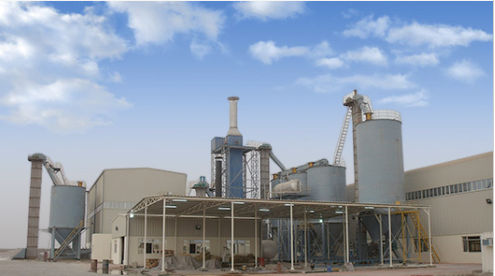Gypsum powder, a versatile and essential material, lies at the heart of numerous industries, from construction to agriculture and food production. Its unique properties, including fire resistance, sound insulation, and soil conditioning, make it indispensable in shaping our modern world. Behind the scenes, gypsum powder production lines are the driving force, transforming raw gypsum rock into the fine powder that fuels these diverse applications.
Gypsum powder production line is a sophisticated system designed to efficiently process raw gypsum rock into high-quality gypsum powder. These automated lines handle every stage of production, from crushing and grinding to calcining and packaging, ensuring consistent quality and optimal performance.
Crushing and Grinding: The journey begins with the crushing of raw gypsum rock into smaller pieces. These pieces are then further ground into a fine powder using specialized mills, ensuring the desired particle size for optimal performance in various applications.
Calcining: The ground gypsum powder is then heated in a calciner, a specialized kiln, to remove a portion of its water content. This process, known as calcination, transforms the gypsum into calcium sulfate hemihydrate, the key ingredient in plaster of Paris and other gypsum-based products.
Cooling and Grinding: After calcination, the gypsum powder is cooled and then finely ground again to achieve the desired consistency and particle size distribution. This step ensures optimal flowability, setting time, and strength in the final product.
Packaging and Storage: The finished gypsum powder is then packaged in bags or bulk containers for storage and transportation. Modern production lines incorporate automated packaging systems to ensure efficiency and product integrity.
Modern gypsum powder production lines offer a multitude of advantages, making them essential for meeting the growing demand for this versatile material:
Enhanced Efficiency and Productivity: Automation and advanced control systems ensure consistent quality and high output, meeting the ever-growing demand for gypsum powder across various industries.
Superior Product Quality: Precise control over every stage of production guarantees gypsum powder with consistent chemical composition, particle size, and setting properties, leading to better performance in various applications.
Reduced Waste and Environmental Impact: Modern lines incorporate closed-loop systems that recycle water and minimize waste generation, contributing to sustainable manufacturing practices.
Versatility and Customization: Production lines can be adapted to manufacture different types of gypsum powder, such as stucco, plaster of Paris, and agricultural gypsum, catering to diverse industry needs.

The impact of gypsum powder production lines extends far beyond the construction industry, influencing a wide range of sectors:
Construction: Gypsum powder is the primary ingredient in drywall, plaster, and other building materials, contributing to fire safety, soundproofing, and aesthetic appeal in modern structures.
Agriculture: Gypsum powder is used as a soil amendment to improve soil structure, reduce erosion, and provide essential calcium and sulfur nutrients for plant growth.
Food Industry: Food-grade gypsum powder is used as a coagulant in tofu production and as a calcium supplement in various food products.
Art and Sculpture: Gypsum powder is a key component in plaster of Paris, widely used for casting, molding, and creating decorative elements.
Gypsum powder production lines are the unsung heroes of modern industry, enabling the efficient and sustainable production of a material that shapes our world in countless ways. As technology continues to advance, these lines will become even more sophisticated, further enhancing efficiency, product quality, and environmental performance. By embracing innovation and sustainability, the gypsum powder industry is paving the way for a brighter future across diverse sectors.
Hot tag: gypsum powder production line, gypsum powder manufacturing, gypsum powder uses .
Processing demand survey
x